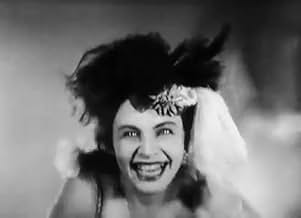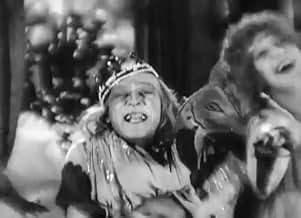No início da revolução industrial, a Comuna de Paris foi fundada em 1871 contra os ricos e os poderosos, e violentamente reprimida pelo exército que permaneceu fiel a uma forma mais domestic... Ler tudoNo início da revolução industrial, a Comuna de Paris foi fundada em 1871 contra os ricos e os poderosos, e violentamente reprimida pelo exército que permaneceu fiel a uma forma mais domesticada de republicanismo.No início da revolução industrial, a Comuna de Paris foi fundada em 1871 contra os ricos e os poderosos, e violentamente reprimida pelo exército que permaneceu fiel a uma forma mais domesticada de republicanismo.
Arnold Arnold
- Commune's Central Committee member
- (as A. Arnold)
- Direção
- Roteiristas
- Elenco e equipe completos
- Produção, bilheteria e muito mais no IMDbPro
Enredo
Você sabia?
- CuriosidadesComposer Dmitri Shostakovich wrote his first film score for this silent movie. He hurriedly wrote about 90 minutes of music.
- ConexõesEdited into Histoire(s) du cinéma: Une histoire seule (1989)
Avaliação em destaque
It is, I suppose, fair to say that this is a propaganda film because it does deliver a political message. On the other hand, it's not too outlandish of a message. Perhaps there were reasons to oppose the Paris Commune, although none occur to me. However, a discussion of propaganda in films is in itself somewhat redundant: most films might face the same charges. After all, film is an art form that chooses to present a series of images and sounds, usually dialogue but also music (and in this case there is in the best version a stunning score by Shostakovich) in order to manipulate the feelings and the thoughts of the viewer. "Apocalypse Now", for instance, is an examination of war and its component parts that does not shy away from politics or advocacy. It is clear to the viewer that the filmmaker is asking questions about why that war was fought. "Armaggedon" also supports a particular political world view, as does "First Blood", "The Seventh Seal", "Sex in the City" and even "Toy Story".
Despite my sympathies, however, it is not the politics that I love about this film - it is not the message but the artful use of the medium that sells me on this work of art. This is a moving and beautiful film, with fully realised character development and wonderfully magical imagery. After the parasols, the train and the cancan dancers, you should keep an eye out in particular for the shots in the last segments of the film. Kozintsev and Trauberg work little miracles with everyday objects such as lace, shovels and pianos. (Amazingly enough, these artists continued their magic for a long time -Trauberg worked until the early 1960s and Kozintsev directed his last film, which many consider the best "King Lear" for the cinema, in 1971.) "New Babylon" is, in a number of ways, a good companion piece for "The Man with a Movie Camera", the best of the Russian silents that I have seen. While it does indulge the "message" shot - there are a number of those but most are extremely well-done and worth seeing; the milk-for-soldiers is one, the juxtaposed lives are another - it is the realism of this film that elevates it, not its occasional slip into histrionics. The female lead, Yelena Kuzmina, is excellent, an actress who commands your attention and earns your sympathy, but it is in all the secondary roles put together that the city of Paris of 1870 and 1871 truly comes alive. In these earlier films, before sound drew us in, it was the faces that needed to speak, and these do, eloquently. The department store owner, the old soldiers, the contemptuous general, the washerwomen and the journalist with hope for humanity, they are all clamoring to tell you something. Exactly what they say to you may depend on your own world view, but their comments should be interesting to everyone.
Despite my sympathies, however, it is not the politics that I love about this film - it is not the message but the artful use of the medium that sells me on this work of art. This is a moving and beautiful film, with fully realised character development and wonderfully magical imagery. After the parasols, the train and the cancan dancers, you should keep an eye out in particular for the shots in the last segments of the film. Kozintsev and Trauberg work little miracles with everyday objects such as lace, shovels and pianos. (Amazingly enough, these artists continued their magic for a long time -Trauberg worked until the early 1960s and Kozintsev directed his last film, which many consider the best "King Lear" for the cinema, in 1971.) "New Babylon" is, in a number of ways, a good companion piece for "The Man with a Movie Camera", the best of the Russian silents that I have seen. While it does indulge the "message" shot - there are a number of those but most are extremely well-done and worth seeing; the milk-for-soldiers is one, the juxtaposed lives are another - it is the realism of this film that elevates it, not its occasional slip into histrionics. The female lead, Yelena Kuzmina, is excellent, an actress who commands your attention and earns your sympathy, but it is in all the secondary roles put together that the city of Paris of 1870 and 1871 truly comes alive. In these earlier films, before sound drew us in, it was the faces that needed to speak, and these do, eloquently. The department store owner, the old soldiers, the contemptuous general, the washerwomen and the journalist with hope for humanity, they are all clamoring to tell you something. Exactly what they say to you may depend on your own world view, but their comments should be interesting to everyone.
- Greekguy
- 14 de jan. de 2013
- Link permanente
Principais escolhas
Faça login para avaliar e ver a lista de recomendações personalizadas
Detalhes
- Tempo de duração2 horas
- Cor
- Mixagem de som
- Proporção
- 1.33 : 1
Contribua para esta página
Sugerir uma alteração ou adicionar conteúdo ausente





























